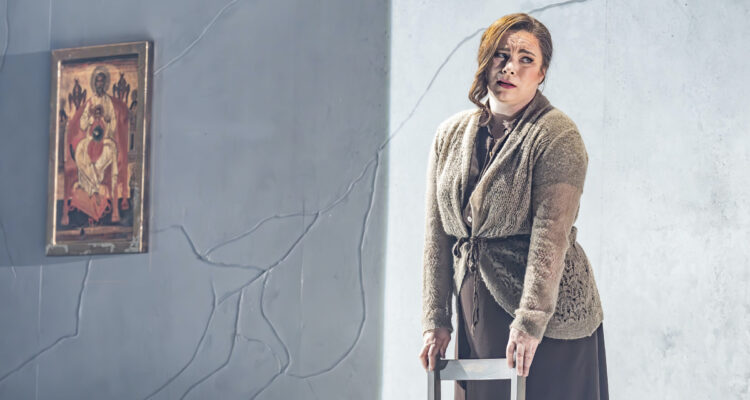Katya Kabanovà is Janàček’s condensed libretto of Ostrovsky’s play, ‘The Thunderstorm’. The play sought to reveal the bigoted traditionalist ways of the merchant class, condemning the destructive power that such a lifestyle could have on the freedom of the individual. Katya was composed in 15 months. The story was personal. Janàček was a late bloomer. He composed Jenufa aged 50, and discovered the joys of passion late in life. He fell instantly in (unrequited) love with Kamila Stosslová, 38 years younger, who he met in a spa. Both were unhappily married. Her photo on his piano inspired his Katya composition. Janàček bequeathed the royalties to Stosslová in perpetuity. She remained his muse until his death.
Katya is miserably married to Tichon Kabanov. His widowed wealthy mother, Kabanicha, one of the nastiest female operatic characters, abuses Katya, making her and her adoptive sister-in-law Varvara’s life intolerable. Varvara love interest is Vanya. When Tichon is away, Varvara slips out to meet Vanya; Katya follows swapping drab brown for a red dress to meet Boris, already in love with Katya. After 10 passionate nights, Tichon returns during a storm. Katya, deeply religious, publicly confesses her mortal sin. Kabanicha wants her buried alive. Katya drowns herself in the Volga.
Director David Alden’s sloping white minimalist set, with the ceaseless flowing of the Volga behind, contrasts with the darkness of the action. Tim Mitchell’s effective lighting using shadows to loom over Katya create menace and isolation. Act 3, set in a disused church with giant swinging crucifix and ominous shadows is oppressive. Negative production points are an incongruous, annoying neon light saying ‘Východ’ (exit) at the back of stage. Also annoying is when the main characters physically close in on Katya’s big Act 3 descent into madness -. ‘Né! Nikdo tu není’ -no nobody is here’. It is more effective if she fights her demons alone.
The performance rightly hinges on the sensational Welsh/Ukranian soprano Natalya Romaniv’s Katya. She soars easily above everyone, her vocal palette has extensive dynamics, switching from delicate pianissimi to full-blooded passion. She vocally and dramatically defines her descent into madness from the beginning, when she is awestruck in front of the religious icon, to her suicide. She exudes star quality dominating the stage both by her physical presence as well as her searingly intense and emotional voice. Her Czech is good and understandable. Her final scene – vzpomenu si – remember -, is riveting.
Janàček composed Kabanicha for a contralto. A soprano Kabanicha cannot sing the mid/ low registers with the correct timbre, if at all. It lies too low. It also unbalances the music for different voice types. British soprano Susan Bullock, struggles as Kabanicha. The top of register is harsh and shouted, there is a hole in the mid-register. Bullock resorts to hollow recitative for the low register so much of the time the voice and the language cannot be heard.
New-Zealand tenor Thomas Atkins, ex Jette Parker artist has an attractive clear voice, though on the small side without the ability to bloom on the crescendos. His Boris is callous. His ‘love’ leading Katya to eternal damnation, is just passing fancy. He sits in his pale suit contently smoking a cigarette when Katya leaves him. Job done. Although, upset by Katya’s unravelling, he is last seen in the same unsullied suit awaiting a train with his luggage, calmly moving on.
British tenor, Benjamin Hullett is undercast as Vanya. He has already sung Vanya in Salzburg and Lyon. His lovely clear tenor easily fills the house. His Czech dancing to the folk tune is charming. We shall hear more of him. English mezzo Katie Bray was a Cardiff winner in 2019. Her shining warmth and energetic portrayal of Varvara, Vanya’s lover, are a joy. They are vocally well-matched, but more passion is needed between them to be a credible couple.
English tenor Adrian Thomson as unsympathetic Tichon is well sung but too old – as old as his ‘mother’. It does feed the strange oedipal relationship between them.
English bass Clive Bayley is suitably revolting as Dikoj, Boris’s uncle.
None of the cast are Czech nationals; notwithstanding the Czech is generally understandable.
Conductor Stephen Barlow controls the music which switches from light folk song to conflicted and tortured to its shattering conclusion with aplomb.
On a glorious summer evening, this is an opera-lover’s treat.
KÀTYA KABANOVÀ (1854-1928)
TRAGIC OPERA IN THREE ACTS
Music by Leoŝ Janàček (1854-1928)
Based on Alexander Ostrovsky’s tragedy The Thunderstorm
First Performance 23rd November 1921 National Theatre Brno
Conducted by Stephen Barlow
Directed by David Alden
Photo Credit Marc Brenner
Cast includes Natalya Romaniw, Katie Bray, Susan Bullock, Adrian Thompson, Clive Bayley, Thomas Atkins, Benjamin Hulett, Jonathon Kennedy.
22nd March 2024
Running time 3 hours 20 minutes with 90-minute dining interval
Sung in Czech with English surtitles

